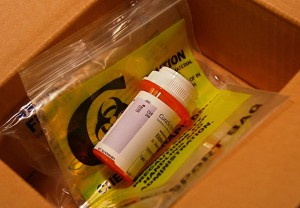The Drug Enforcement Administration is the long arm of the failed drug war. And by any means necessary, in the federal government’s collective mind, the drug war must go on. One way the government gains support for the war on drugs is with fear tactics. The latest scare—prescription drug addiction.
The DEA is using the threat of the black market prescription drug trade to dig into people’s private pharmaceutical records without a warrant. And at least in Oregon, it’s a problem that is now headed to court.
 The state of Oregon created the Oregon Prescription Drug Monitoring Program in 2009. It involves a database including information on everyone in the state who is receiving prescription drugs that have a potential for abuse. Such drugs include pain pills that could be used for chronic disease or disabilities, anxiety medication that could be used by someone with psychological issues, or testosterone injections used by a trans-gendered person. In other words, these are private medical issues.
The state of Oregon created the Oregon Prescription Drug Monitoring Program in 2009. It involves a database including information on everyone in the state who is receiving prescription drugs that have a potential for abuse. Such drugs include pain pills that could be used for chronic disease or disabilities, anxiety medication that could be used by someone with psychological issues, or testosterone injections used by a trans-gendered person. In other words, these are private medical issues.
In designing the PDMP, the state required that law enforcement agencies obtain a warrant before having access to any of these records—a warrant that requires the input of a judge. Instead, the federal law enforcement agency has been using administrative subpoenas, which no judge has to sign off on. In other words, the DEA is digging into the pharmaceutical records of the people of Oregon without any oversight.
In an effort to stop this, the state of Oregon has sued the DEA with the ACLU coming in to help them. Their argument is a logical one—that the prescription records of a person are private and should therefore be protected by the Fourth Amendment (which covers unreasonable searches and seizures). To this end, the DEA should have to get a warrant approved by a neutral judge before having access.
The DEA says, like the garbage you put out for the garbage man, once your prescription records become the property of a third party (the PDMP in this case), you have no expectation of privacy and they don’t need a warrant. In the case of your garbage, this third-party argument has worked. But your medical records are not garbage. You didn’t abandon this information and it’s certainly not like you have a choice as to whether your prescriptions are entered into PDMP.
Here’s hoping the judge sees it that way.
Prescription drug laws are tricky because many people need the medication they are accused of abusing. In some cases, you could actually have a legitimate medical condition that warrants the prescription, but the war on drugs has made it increasingly difficult to get it through conventional means. Whatever the case, if you are now charged with a crime involving prescription drugs, get legal help.